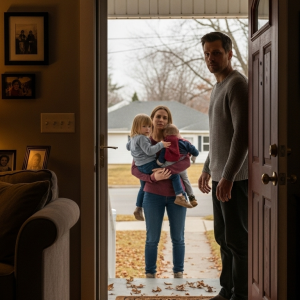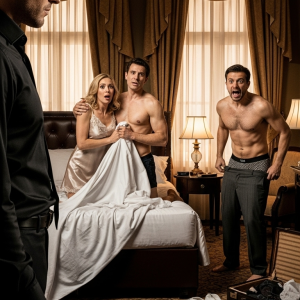I was twelve years old when my family effectively abandoned me. A year prior, my parents sat me down and announced they were getting a divorce. There had been no fighting, no yelling—just a quiet, clinical decision. Mom would be moving out with her new boyfriend; Dad’s mistress would be moving in. They promised I would be their top priority, that I’d have the best of both worlds, shuffling between their two new homes just two miles apart. They promised video games and vacations. I just wanted my family back.
It was a lie. The transition was brutal. I watched my mom pack her things and leave, only to see my dad’s new partner unload her truck and claim my parents’ bedroom as her own. This new stepmom came with twin boys my age who hated me as much as I hated them.
I thought I’d find refuge at my mom’s, but soon after she moved in with her boyfriend, she became pregnant. I was no longer a priority; I was an inconvenience. Her new husband was uncomfortable with me around, and their constant public displays of affection made my skin crawl.
I started spending more and more time with my aunt, my dad’s older sister and my godmother. She lived alone, and her house became my sanctuary. After a year of being shuffled between three houses, I moved in with her permanently.
It took my parents more than three months to realize I was gone. Mom thought I was at Dad’s; Dad thought I was at Mom’s. Neither bothered to check. They were so consumed by their new families that they forgot I existed.
My aunt was my savior. She made me feel loved and wanted. We’d go out for dinner and movies. We’d visit my grandpa at his farm in the countryside during the summer. I started working at her plant nursery after school to earn my own way, feeling guilty for being a burden.
My parents, meanwhile, faded into the background. They forgot my birthdays. When my aunt reminded them, I’d get a perfunctory call. When I was sick, they never showed up. At my high school graduation, only my aunt was there to cheer for me. I grew so resentful that I stopped answering their calls, and eventually, they stopped calling. They blamed me, of course, saying I’d grown rude. I let them. I didn’t want them in my life.
After high school, I went to university and moved out of my aunt’s place, though I still visit her for every holiday. She’s the only family I have.
Three months ago, my grandpa passed away. My aunt and I were the closest to him; my dad and his other brothers barely visited. The irony was thick as they all showed up for the funeral and the reading of the will.
The will was brutal. Grandpa left everything—his 150-acre farmland, the farmhouse, and $1 million in cash—to my aunt. The rest went to charity. His sons got nothing. He had been ill for a long time, and despite my aunt’s pleas, none of them had come to see him in his final days.
My aunt, my true north, called me home. She told me she was giving the entire $1 million to me. I had often told her about my dream of starting my own company, and she wanted to make it a reality. I just hugged her and cried. If not for her, my life would have been miserable.
It didn’t take long for the news to reach my parents. Suddenly, their phones were blowing up mine. They were showering me with a sudden, suffocating, and “unconditional” love.
Last week, my dad showed up at my dorm. He praised my academic success and then asked why I wasn’t visiting his home.
“When was the last time you called me?” I asked him.
He stood there, silent, before deflecting. “Oh, you’re still mad about the divorce? Come on, move on. We both love you. Your mother misses you, too. Let me drive you home for dinner.”
“Back off,” I said, my voice cold. “The only family I have is my aunt. You both abandoned me long ago, so quit the fake love act. I know why you’re here. That million dollars brought you here, right?”
He denied it, of course, claiming he only had love in his heart. He said he was here to ensure he and my mom were invited to my university graduation, unlike my high school one. I hated the conversation, so I left, saying I had a class. That same day, my mom left a voicemail, echoing the same sentiment. I didn’t want either of them at my big day.
My graduation day came and went. I got extra tickets, just in case they showed up uninvited, but they didn’t. They never even called to ask for the date. It was just an excuse.
Almost three months later, the real reason for their rekindled love became clear. My mom called.
“Your half-sister just graduated from primary school,” she said, getting straight to the point. “We’ve put her in a private elementary school, but we’re short on funds. We want you to pitch in.”
I was flabbergasted. “Why?”
“She’s your sister. You should fund her education,” she said coolly. “We know your aunt gave you the million-dollar inheritance. What else are you going to do with it?”
I stopped her right there. “Hello? You’re delusional. I have never even seen this sister you’re talking about. Where were you when I needed my mom?”
She started to sob. “What can I say if you’re still stuck in the past?”
“I have plans for that money,” I said firmly, “and I cannot spare a penny.” I hung up.
A week later, I got a call from a bank. They wanted me to pay for my dad’s defaulted mortgage. Dad had given them my number, telling them to contact me because he had “run out of money.” I panicked, but a quick call to a lawyer friend confirmed I was not legally obligated to pay his debts. When the recovery agent called back a week later, his tone was aggressive.
“Who gave you the right to talk to me like this?” I shot back, my confidence restored. “Did I default on the mortgage? No. Then you better watch your tone. I am not paying a penny. You can contact the person who defaulted, and not me.”
A couple of hours later, my dad’s wife called, screaming. “What did you tell them?” she shrieked. “They came here and got physical with your father! They said they’d break his bones!”
“I just told them to chase the original debtor,” I said calmly.
“Don’t you have a heart? Your father is struggling, and you’re looking the other way despite having so much money!”
“No, I don’t have a heart for him, because he didn’t have one for me,” I retorted. “He has a heart for you and your boys, so why don’t you guys chip in? I’m sure he took that loan for you people.” I hung up on her.
That same night, my dad called. He was drunk and sobbing, apologizing for his mistakes, for not treating me right, for everything. He pleaded for my forgiveness.
“Sorry and remorse don’t matter to me anymore,” I told him. “I have learned to live without you, and I would like to have it that way.”
After those calls, I felt a pang of remorse. Maybe I should have helped. But before I could act on it, I got an invitation from my mom for dinner. “Just the three of us,” she wrote. “Like old times.” I was wary, but I wanted to end the saga, so I accepted.
The dinner was a performance. They repeated the same script my dad had used on the phone: apologies, remorse, forgiveness, getting back together as a family. I just played along, nodding and smiling, waiting for the other shoe to drop.
It didn’t take long.
“Baby,” my mom said, her voice syrupy sweet. “We were wondering… what plans do you have for the money? Your dad and I could give you some good investment advice.”
“My aunt is helping me with that, so I’m good, thanks,” I said casually.
A few minutes of silence passed before she tried again. “You know, your dad is in trouble because of that mortgage.”
“I know,” I said, turning to him. “Dad, why did you take that personal loan?”
He lowered his head. “For his son’s college,” he mumbled. Before I could react, my mom jumped in.
“Doesn’t matter! The point is, your dad is in trouble and we have to help him. I was thinking, why don’t you clear off his mortgage? His stepson will pay you back once he gets a job. And the remaining money, you can give to me for your half-sister’s private school. She’ll pay you back when she’s older.”
I looked from her face to my dad’s. The audacity was breathtaking.
“How about,” I said, my voice dripping with sarcasm, “we silently eat our dinner and call it a day?”
Her mask of civility shattered. “You are still that attention-seeking brat who only cares about himself!” she shrieked, her voice cracking with fury.
“Yeah, that’s what I am,” I said, standing up. I could have lectured them, but what was the point? They knew I had my own student loans, yet they wanted me to fund their new families while I worked to pay off my own debt.
“I am done with you guys,” I said, my voice low and final. “I was right. You only came back for the money. And you know what? You don’t get a penny.”
I left my share of the dinner bill on the table and walked out, leaving them sitting in the ruins of their own making.
I didn’t hear from them for a month after that dinner.
Not a text. Not a call. Not even one of those vague “thinking of you” messages that people send when they’re trying to bait you into a conversation. I figured they were either regrouping or realizing that the well had officially dried up.
Then the letters started arriving.
First, a handwritten one from Mom—three pages, double-sided. At first glance, it looked like a heartfelt apology. But between the syrupy language were carefully placed guilt bombs: Family is forever. Your little sister looks up to you. Money is just paper, but family is blood.
It ended with a neat little postscript: P.S. — We’re still about $17,000 short for the tuition. Let’s talk soon.
I didn’t reply.
A week later, a typed letter from Dad arrived—short, to the point, and dripping with entitlement: Your refusal to assist me has damaged my credit irreparably. I hope you’re happy knowing your own father is living in fear of losing his home.
I didn’t reply to that one either.
My aunt noticed I was quieter than usual.
“You’re not still thinking about helping them, are you?” she asked one evening over tea.
I shrugged. “It’s hard to just… shut it all off.”
She set her cup down and looked at me in that no-nonsense way only she could. “They shut it off first. Remember when you were twelve and they didn’t notice you were gone for three months? That wasn’t an accident. That was a choice. You’re not cutting them off now—you’re just finally acknowledging reality.”
Her words landed like an anchor. I didn’t realize until that moment how much of my life I’d spent waiting for them to wake up and suddenly start loving me.
Two weeks later, I got my proof that I’d made the right decision.
A friend from my old neighborhood sent me a screenshot from Facebook. There was Mom, smiling in a selfie at some café, tagging Dad and captioning it: So proud of our family! Just waiting for our big break!
In the comments, her friend asked, What’s the big break?
Mom replied: My son’s inheritance. We just have to convince him it’s the right thing to share.
The rage hit like a hot wave, but it was quickly followed by something else—clarity.
I wasn’t the villain they painted me as. I wasn’t selfish for saying no. I was the only one in this equation who’d been honest about my intentions.
That weekend, I sat down with my aunt and told her I was ready to make my plans public. She’d been encouraging me to start my company for months, but I’d been hesitant, knowing the noise it would stir up with my parents.
We filed the paperwork on Monday. By Friday, I posted the announcement online:
Excited to share that I’m officially launching my own company—funded by my late grandfather’s gift and the unwavering support of my aunt. This is for everyone who believed in me when it wasn’t convenient.
The comments poured in—old teachers, college friends, even Grandpa’s neighbors congratulating me. It was overwhelming in the best way. But buried in the middle were two comments that told me everything I needed to know:
Mom: So proud of you, sweetheart. Call me so we can talk about helping the family too!
Dad: Congrats, son. Let’s meet about an investment opportunity.
I didn’t delete them. I wanted them there, public and unedited—a testament to why they were no longer part of my inner circle.
The following month, I heard from my lawyer friend again. “You might want to know,” he said over the phone, “your dad’s mortgage went into foreclosure. House is on the market.”
I waited for the guilt. It didn’t come.
On my birthday, my aunt threw a small dinner—just a few close friends, no speeches, no drama. Toward the end of the night, she pulled out an envelope. Inside was a faded photograph of Grandpa and me on the farm when I was maybe eight years old, sitting on the fence and laughing about something I can’t even remember now.
“He would have been proud of you,” she said softly. “Not because of the money or the business, but because you finally understand your worth.”
For the first time in years, I believed it.
The last time I saw my parents in person was at the grocery store a few weeks later. They were together, walking down the frozen foods aisle like a couple out of a sitcom, laughing at something in their cart. They didn’t see me at first.
I had a choice in that moment—walk over, make small talk, pretend like the past was just water under the bridge. Or keep walking.
I chose the latter.
Because the truth is, I’m not twelve anymore, waiting for someone to notice I’m gone. I’m not eighteen, praying for them to show up at my graduation. I’m not twenty-two, wondering if saying no makes me a bad person.
I’m just me. And that’s enough.




